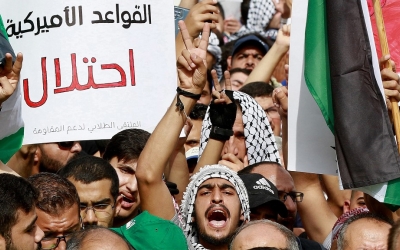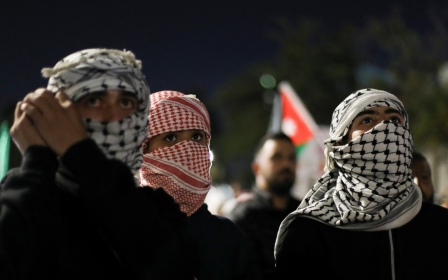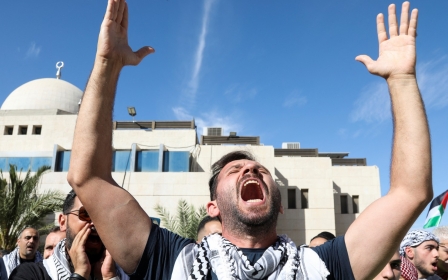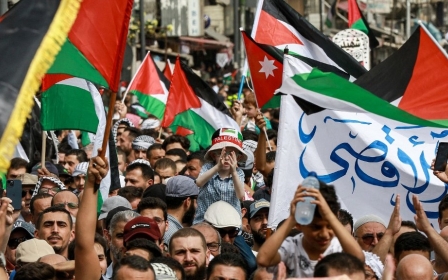War on Gaza: Jordanian rage over Israel is set to explode further in 2024
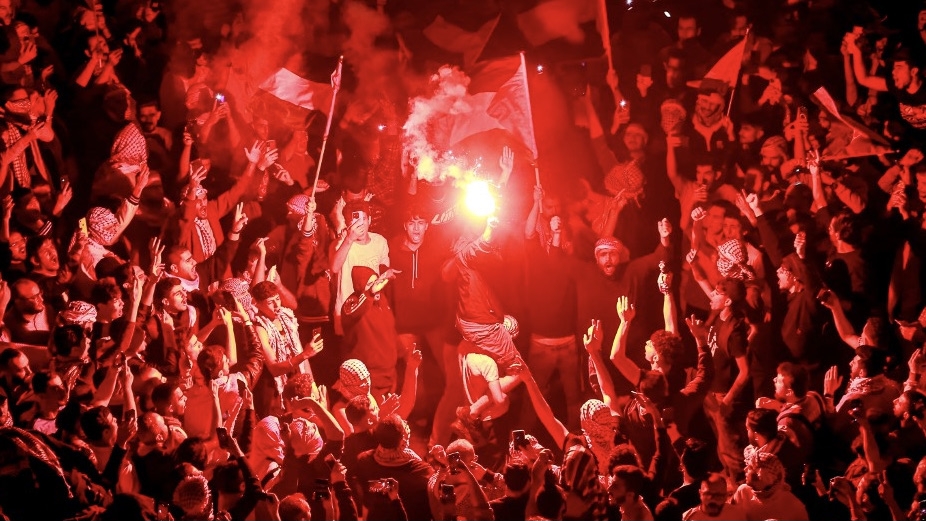
Jordan is witnessing the largest wave of solidarity with Palestinians in the history of the kingdom.
Nothing like this has been seen in two generations. It is crossing the geographic divide between Palestinians and eastern Jordanians. It is bedevilling the king's attempts to keep a lid on it.
It might yet fundamentally reverse Jordan's recognition of its mighty neighbour, making its 360km border - over four times the length of Israel's border with Lebanon - a live one.
It reached its peak two weeks ago when the kingdom woke up to a general strike, the largest in its history, as the streets were almost empty, and the main demand of the millions of Jordanians who participated was a ceasefire in Gaza and the severing of Jordan's relations with Israel - in all its forms and immediately.
On that Monday, shops and markets closed their doors, and even bakeries, restaurants and cafes stopped working. The next day, the Jordanian Artists Association suspended concert permits for New Year's Eve and during the Christmas holiday season, in solidarity with Gaza and out of respect for the blood of the victims who have died in the war.
New MEE newsletter: Jerusalem Dispatch
Sign up to get the latest insights and analysis on Israel-Palestine, alongside Turkey Unpacked and other MEE newsletters
The stand-out feature of all this was that the strike was generated and grew from the bottom-up - there were no political forces, unions or civil society institutions behind it.
It was called for by hundreds of individuals and observed by millions. This made it impossible to prosecute or control the organisers. Had the strike been the work of a political party, a crackdown would have followed, as day follows night.
Nervous government
The spontaneity and popularity of the protest were enough to cause the ever-nervous government huge concern. The next day, King Abdullah convened an emergency meeting of his generals, security chiefs and the Ministry of Interior.
The meeting ended with statements by the king, broadcast by the government news agency, which bent with the wind of popular mood.
Follow Middle East Eye's live coverage for the latest on the Israel-Palestine war
He said that "Jordan must remain strong" and that "a strong Jordan is [one] that can support the Palestinians". He reiterated "the necessity of reaching a political solution to the Palestinian issue and ending the war in Gaza".
Almost 60 percent of the population is Palestinian, but the striking thing about this wave of protest is that it was not limited to them. This time the anger generated by the genocide being carried out by Israel in Gaza permeated all segments of Jordanian society, clans and tribes.
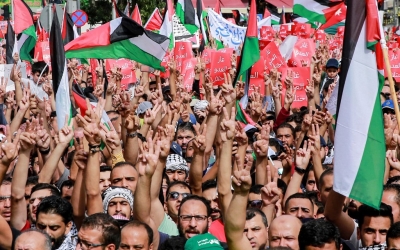
This represents a complete about-turn. Jordan had a miserable history of conflict between the army and the Palestine Liberation Organisation. A bloody war broke out in 1970 between the Jordanian army and the forces affiliated with the PLO, and that war ended with the departure of all Palestinian fighters from Jordan to Lebanon in the summer of 1971.
Since then, the Jordanian scene has been almost completely neutralised from the conflict with Israel. The borders have calmed down and, most importantly, Jordan has since witnessed a sharp division within society between citizens whose origins go back to Palestine (and who arrived in Jordan as refugees), and the original citizens, many of whom consider the Palestine issue not to be a priority for them.
The degree to which Jordan interacted with the events in Palestine has varied sharply throughout these years, but this situation is witnessing a tangible change.
The historic division between Palestinians and east Jordanians has melted away in a generational change. The new generation no longer feels the barriers that their fathers adhered to.
'All Jordan is Hamas'
The rise of the Hamas movement during the last two decades has also played an important role in ending the Jordanian-Palestinian divide, because many Jordanians believe that the dispute was only with the PLO, of which Hamas is not a member.
This was clearly demonstrated in recent protests in Jordan, when hundreds of thousands chanted in the street: "They said Hamas is terrorist. All of Jordan is Hamas." The Jordanians also chanted slogans praising the symbols of the Hamas movement, including the military spokesman named "Abu Ubaida", whose face no one has ever seen because he is always masked.
All of this constitutes clear support on the part of the Jordanians for the Hamas movement. On the other hand, since 1970, no demonstrations in Jordan have seen chanting in support of the Fatah movement or the PLO or, indeed, Yasser Arafat.
Solidarity festivals have sprung up in towns and cities across the land, with demands that have gone far beyond official government policy, and way beyond the carefully manicured political elite in parliament.
It would be foolish to dismiss this as hot air from the Arab street, which blows itself out the moment the conflict stops
There were calls for volunteers to fight. There were calls on the army not to prevent them from crossing the border into the occupied West Bank to support the Palestinians being continually attacked by settlers and the Israeli army.
These calls are not without weight. It would be foolish to dismiss this as hot air from the Arab street, which blows itself out the moment the conflict stops.
For a start, Jordan hosts the largest Palestinian refugee diaspora in the world. It has 13 refugee camps, which are home to 396,000 people. That is in addition to the hundreds of thousands of other Palestinians who hold Jordanian citizenship and live in the cities and regions.
But there are no official statistics. If over half the citizens of the kingdom are Palestinian then that means they are in their millions.
Smuggling weapons
Then there is the border. Before the peace treaty that former King Hussein signed with Israeli Prime Minister Yitzhak Rabin in October 1994, the border was an open front through which fighters could pass easily and launch attacks.
From 1965 to 1971, it proved impossible to secure completely. The Israeli army was unable to calm it until the PLO left Jordan and moved to Lebanon.
When compared to the borders between Israel and Lebanon - 79km - and between Israel and Syria - 70km - it is easy to see why. To secure the 360km border, Israel would need five times the forces it currently has in the north facing Hezbollah's positions south of the Litani river.
Unlike Lebanon or Syria, popular rage in Jordan has very specific and local targets, with dozens of protests focused on the Israeli and American embassies.
The security forces were forced to close many of the roads around them, and on more than one occasion the demonstrators almost stormed the Israeli embassy compound.
More important than this are the repeated attempts to reach the border. The army has had to beef up its presence on the borders and the security forces have arrested more than one group trying to smuggle weapons into the occupied West Bank - one of the demands of the protesters.
None of this is going to die down anytime soon, particularly if Israel continues its offensive against the Jenin refugee camp and the settlers continue attacking defenceless Palestinian villagers in the occupied West Bank.
If 2023 was a year plagued by war, then 2024 will, as far as Jordan is concerned, be hotter still.
The views expressed in this article belong to the author and do not necessarily reflect the editorial policy of Middle East Eye.
Middle East Eye delivers independent and unrivalled coverage and analysis of the Middle East, North Africa and beyond. To learn more about republishing this content and the associated fees, please fill out this form. More about MEE can be found here.



